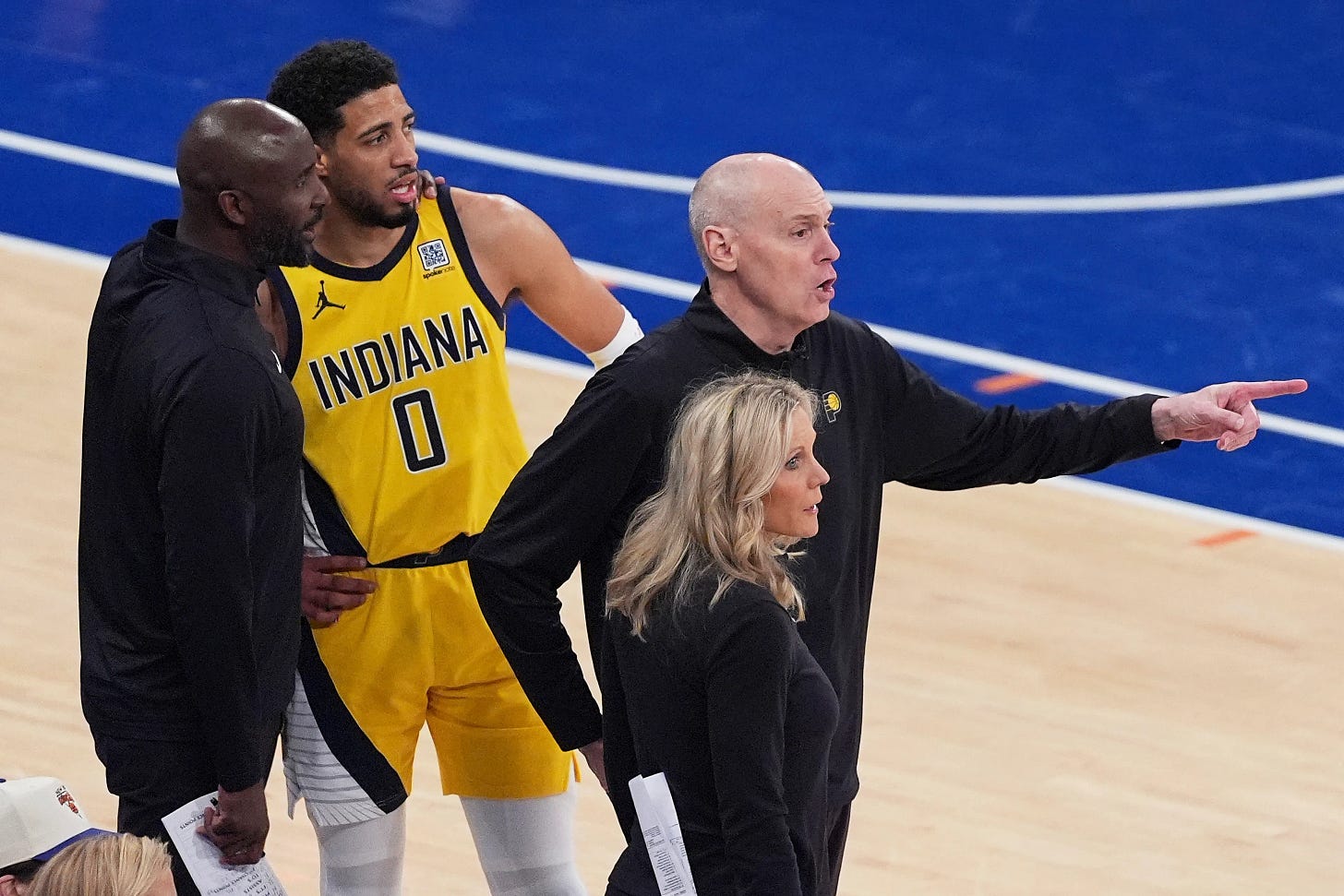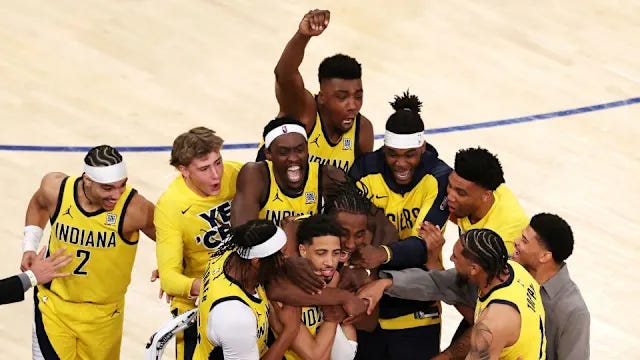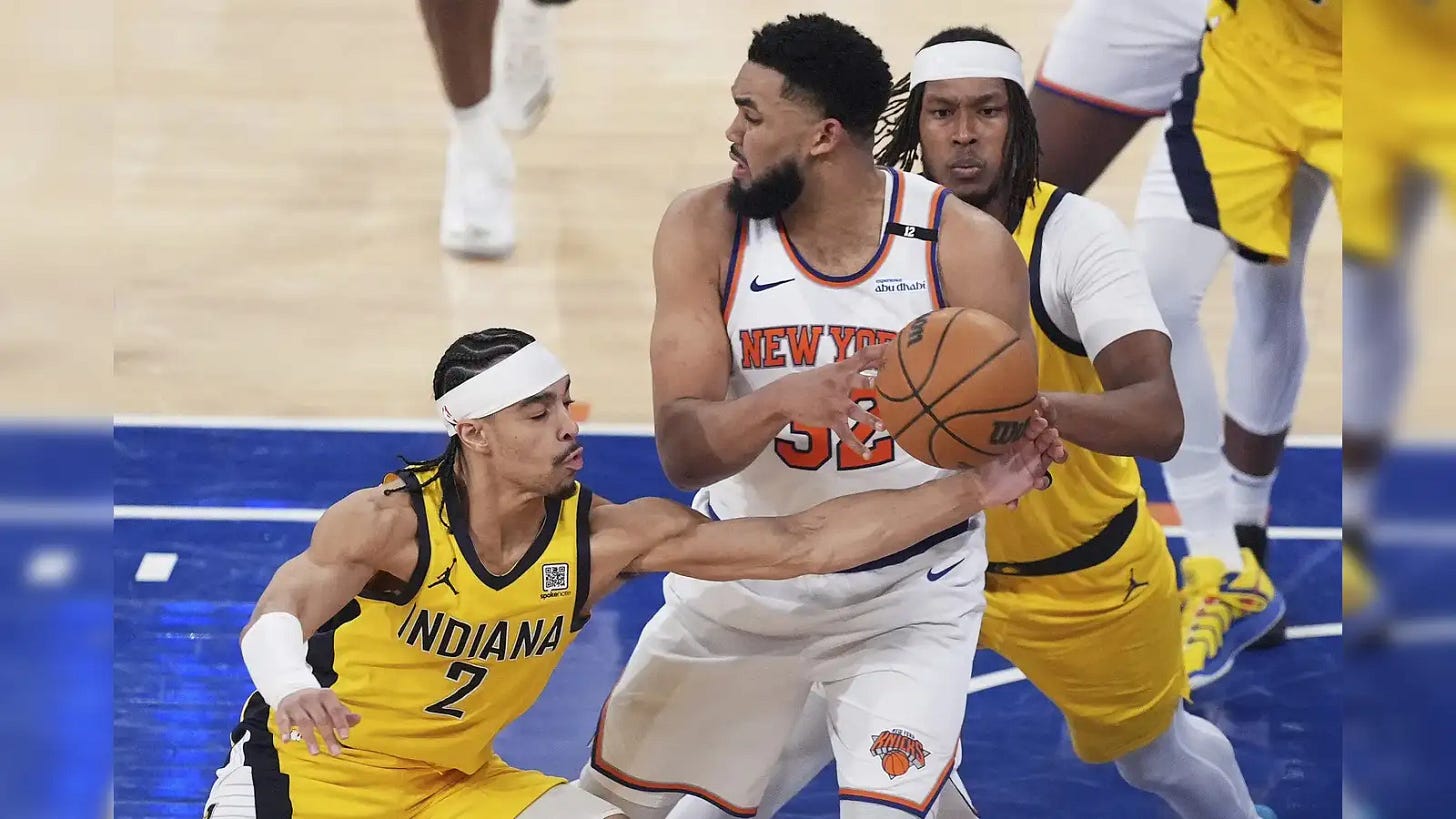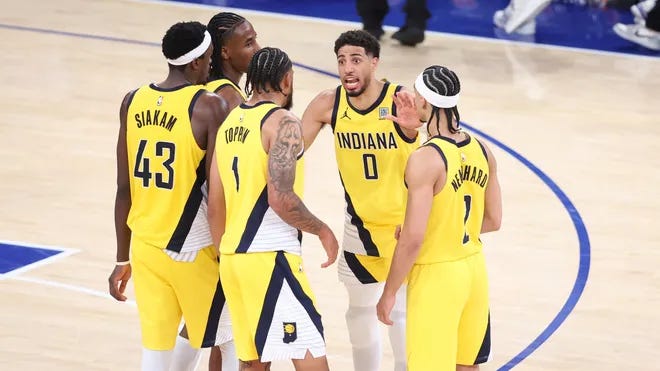What Does the Ideal Team Look Like?
I'm going to offer my list of those qualities but also take a risk in illustrating it
Patrick Lencioni wrote a book called The Ideal Team Player where he answered a question, in his typical leadership fable style, that might be characterized as: what qualities would you most look for in someone joining you team? Also, I recently wrote about the qualities and qualifications we look for in the leader of a church and others have addressed that with their own lists or suggested additions (some in response to mine.)
However, it has me wondering, isn't there a question before that question? What are the qualities of the ideal team that might be looking for the ideal team player? What does the perfect team look like, in your opinion?
Of course, the ideal team for most of us has to do with what the team is doing: their goal and purpose. But beyond that, regardless of the goal and purpose of the team, what qualities are present in the ideal team no matter the kind of team or the aim of their mission?
I'm going to offer my list of those qualities here but also take a risk for some of my readers and illustrate each of these qualities in a unique way by talking about how I see these qualities evident in one of my favorite teams of all time, this year's Indiana Pacers! Don't worry, you don't have to be a basketball fan to understand what I'm talking about here. Each of these team qualities stands by themselves and they aren't about basketball at all. They apply for most any team and I just thought I'd just enhance this list with a particular basketball team as an example.
If you're not a big "sportsball" type you can skip the basketball illustration and still get what you might want for the future teams in your life. Or you might be a fan of another team and don’t particularly like the team I’m praising (or you might even be a Knicks fan—if so, ouch!) In any case, you can skip over those parts if you like, I even marked them with a little “🏀” so you know where they are.
So here is my list of qualities that I think the ideal team has:
Development Culture
Team members are committed to personal development and helping each other improve over time. The culture of the organization is one that doesn't expect everyone to show up as a complete player on day one, but instead they have systems and practices that develop young talent and even experienced veterans so everyone can become their best.
🏀 I love how Pacers Coach Rick Carlisle keeps developing young talent. While the Pacers have added players at all stages of their careers, most have taken a leap once they got here. One moment that summed it up for me was during a blowout win over the Cavs in the playoffs. Even with the game and series already locked up, Carlisle was standing and engaged on the sidelines, coaching every player who came off the floor—teaching, correcting, encouraging. Rick never stops helping our guys grow, especially the young ones, and that development culture shows up all over this team. Other coaches are known for being good with stars or vets, Coach Rick and his team are good with all of the players at every stage, helping them all level up.
Teachable Humility
You'd imagine that any ideal team is not full of arrogant jerks, so perhaps this is no surprise. But I do think it's key that in a good team egos take a back seat as each team member remains teachable, open to feedback, and focused on the mission at hand. I was with a team recently brainstorming about ideal candidates for internships and young recruits. Over and over again the team verbalized in different ways that the overarching quality that is the gateway to all the other qualities we desired was just one thing: teachability. Teachable humility is the gateway to most everything good in an ideal team.
🏀 The Pacers’ unselfish playstyle, including leading the league in passes per game, has shown their collective humility and team-first mindset. Tyrese Haliburton is the clear floor leader and best player the team is built around, and Pascal Siakam is an all-star and named Eastern Conference Finals MVP, but both deflected personal praise over and over again when featured in the press and interviews. In the closeout game against the Knicks in the Eastern Conference Finals, Tyrese passed up several chances to “get his” and score more in order to find the best shot for others on the team. Miles Turner, facing free agency, could have made it all about himself this post-season, but instead, he used his postgame interview to praise his backup’s standout performance, something that quite literally could cost him money in the negotiations by influencing the Pacers to think they can move on from him next year even though he’s our longest serving team-member. That kind of humility seems to be baked into their culture.
Mutual Accountability
Everyone takes responsibility for their role and holds one another accountable with grace and clarity. The team doesn't let things go that might erode the core values or might cause an overall slide in quality and excellence. Conflict isn't avoided, but part of the ideal team’s pattern is to offer voluntary submission to one another as they all get better for the mission.
🏀 The Pacers emphasize accountability in a way that’s rare in the NBA. Coach Carlisle will bench players immediately after a mistake, like they are middle school players, not pros making millions. Instead of the coach and player both sulking into the silent treatment, the player gets a quick teaching moment from Carlisle on the way to the bench. Sometimes other players, like veteran NBA journeyman James Johnson, will even chime in with coaching tips as they head to their seat, reflecting on their mistakes. A recent example came in the final game of the Eastern Conference Finals: Thomas Bryant, previously benched for messing up, as many players referenced in post-game interviews, stepped up with stellar defense and scoring. After the game, both his teammates and coach praised not just his play, but how he stayed engaged after being benched, kept learning, and was ready when his moment came. That’s mutual accountability in action.
Purposeful Drive
The team works hard, not just to succeed, but to pursue something bigger than themselves. They are willing to go after something when needed, kicking into high gear occasionally when the demands are pressured. Sometimes a little extra is needed and the goal of the ideal team is not just to enjoy one another’s presence. The mission is not to have a good place to work. There’s a goal to go after.
🏀 The Pacers weren’t expected to be in the Eastern Conference Finals by most analysts, much less in the NBA Finals themselves, and most everyone picked the Knicks to beat them in the Eastern Conference Finals. Yet their players consistently talked about proving doubters wrong together and doing something special for the city of Indianapolis and the state of Indiana. Every player knew their role and was fully bought in to go the extra mile. Of course in sports there is a championship to think of, and it’s perfectly clear what the drivenness is all about: winning. But the Pacers have done this in a way where the drive seems focused on what’s needed in each game at hand, winning in multiple different ways as required.
Resilient Flexibility
Teams with this quality adapt under pressure, bounce back from losses, and pivot when needed without losing momentum. Every team will have seasons when they face more criticism, or things seem to not be working out, facing failure. The best teams will overcome these times with determination without sniping at each other along the way. The hard times bring them together, instead of tearing them apart.
🏀 One of the defining traits of the Pacers team this year was how they adjusted defensively during the playoffs, particularly against New York. After being exposed in Game 5, they came back in Game 6 with a defensive intensity and completely new rotations and defensive assignments that seem to stun the Knicks into inaction. Even with key defensive player Aaron Nesmith limited by an injury that forced a rotation change, the team never unraveled and Andrew Nembhard stepped up, contributing an unexpected version of Nesmith's tenacious defense all the sudden, even though the player had underperformed in the series so far. The Pacers showed the kind of mental toughness and tactical flexibility in ways far beyond their youth and just seems to derive from their culture, not them each as individuals.
Strategic Insight
Teams with this quality demonstrate sound judgment, long-term thinking, and the wisdom to make wise choices during uncertainty. They make smart decisions, instead of just blindly barging into situations with their instincts alone. They don't just keep doing the same thing over and over again, but instead react with intentionality and precision.
🏀 The Pacers front office's decision to maintain a lot of roster continuity last year reflected a strategic approach to team development and even loyalty—a rare thing in professional sports. Rather than listen to those who dismissed their success in the prior year as being due to injuries on other teams, and instead of any panic at the trade deadline where they might chase bigger names in free agency, the Pacers’ front office prioritized player growth and chemistry. The trade the prior year for Pascal Siakam was a calculated and measured one. Instead of the grab for star power most teams go for, the Pacers moved to bring in a perennially underestimated veteran who could contribute and, most importantly, fit the culture.. He might not have been the best player for every team, and in fact all other teams passed up the opportunity to get him as he was available, but he was right for the Pacers. Similarly, Coach Carlisle’s rotations in the playoffs weren’t flashy, but often neutralized opponents’ strengths, showing strategic insight all along the way at every turn.
Relational Intelligence
Ideal teams understand how people work, communicating with empathy and clarity. There is just a kind of "emotional intelligence," not an IQ (intelligence quotient) but an EQ (emotional quotient). The leaders of teams like this don't dismiss how things feel or when people seem hurt by something. Instead, they lean into the relational dynamics that glue a team together through thick and thin.
🏀 It’s rare in pro sports to see such seamless chemistry on a roster made up of players from so many backgrounds. Usually there are some leaks to the press and examples of players who aren't happy with their role. Myles Turner has been chatted about in the press with trade rumors for literally years and years, yet he doesn't let that get to him, and has stayed focused on the team itself. Tyrese Haliburton’s leadership stands out most of all in this area: he seems to have a rare ability to elevate others through encouragement, not ego, and people just want to play with the guy as he makes everyone better even if it's a little corny at times.
Missional Alignment
Ideal teams share core values, a common purpose, and a clear understanding of where they’re headed together. Being just one degree off in the trajectory is no big deal in the short term, but that one degree gets further and further apart as you go along, so it's key to have a singular focus as a team so that other things are sacrificed for the aligned goals.
🏀 From media day to the playoffs, the Pacers talked about their goals in a way that sounded like a choir singing in unison: play with pace, play selfless, pass the ball, and win as a team. From the rookies and second-year players to the over-a-decade-vets, every player articulated the same values when asked about the team. They just have an identity when others do not. Even when the ball wasn’t falling through the hoop and they were losing, the commitment to a fast-pace and trusting the pass remained unwavering. All this I think is proof that they weren’t just playing together, they believed in something together.
Bold Trust
Team members need to feel safe in order to be honest, take risks, and rely on one another. Trust is built over time, and you have to earn it, in a way. But in another way you just have to trust first to know that you can trust at all, and who you can trust. It requires a culture made up of team members who want to trust each other, and have the boldness to truly put their future in the hands of others.
🏀 The Pacers' cohesive playstyle and mutual support reflect a high level of trust among players and coaching staff. In close playoff games, you could see the trust in action. Instead of just the max contract players, it was Andrew Nembhard, Miles Turner, Aaron Nesmith and other role players who often were taking late game shots with full confidence, not because of individual bravado, but because teammates trusted them with the ball when it mattered most. The freedom Coach Carlisle gives his players to make plays, sometimes even unconventional ones others wouldn't try, is a signal that trust has been built day in and day out. Even when mistakes happen, no one spirals or isolates. They regroup, adjust, and move forward together.
Clear Communication
Ideal teams speak openly, listen actively, and ensure their messages are understood with precision and transparency. Clarity is gained through effort, not some mystical ability to speak brilliant sentences. It takes time. Clarity comes through conversation: finding out what the other person doesn't understand, not just talking at people with more volume or intensity, but through question and answer dialogue.
🏀 On the court, you could hear the Pacers players constantly communicating by calling out screens, directing defensive switches, and encouraging each other on offense. The Pacers also led the NBA in passes per game, and an assist is basically the basketball equivalent of communication and clarity. Off the court, press conferences and mic’d up segments revealed a team that talks with each other, not just at each other. That kind of clarity doesn’t happen by accident, it’s a practiced, intentional rhythm.
Diverse Experiences
The team brings a blend of experience and insight that helps them make better decisions together. Each person brings something unique to the table, and they collaborate without competing with each other for attention. The team has complementary strengths due to what they've experienced in life and their natural strengths. This includes their background such as growing up in a minority culture or growing up in another country or speaking multiple languages.
🏀 This year’s Pacers are a rare blend of youth and veteran presence. You have Tyrese Haliburton, one of the brightest young players in the league, considered by many to be the best pass-first point-guard distributor of this generation (a dying breed, perhaps). Alongside Tyrese is Pascal Siakam, an NBA champion and solid one-on-one scorer when needed. I also have to mention James Johnson, who is on the bench at almost all time but serves as a mentor and emotional anchor for the team, many say. Whether it’s high-flying athleticism (Obi Toppin), seasoned playoff composure (Siakam), or gritty defense (Aaron Nesmith and Andrew Nembhard), each player adds a unique experience and contribution and the whole is far greater than the sum of its parts in this case.
That’s my list. I hope it helps you think about the teams you've been on or currently serve on. Just one team member can contribute in a way that helps the culture of a team move in these directions. I think these qualities not only define my favorite team, the Pacers, and their current season but also serve as a blueprint for building any successful team. What else would you add to this list that you think is important for a team? Leave your thoughts in the comments.









